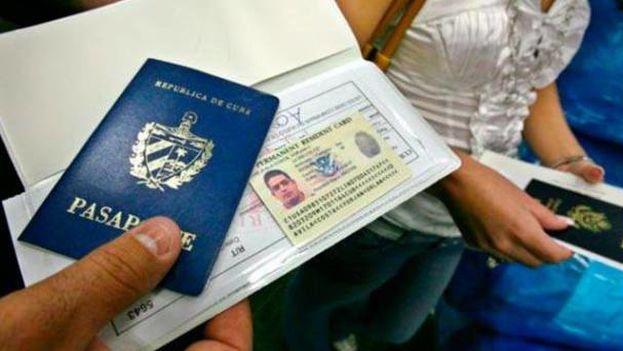
![]() 14ymedio, Luz Escobar/Mario Penton, Havana/Miami, 5 October 2017 — A few days after the US authorities announced the suspension of the issuance of visas at its embassy in Havana, the State Department has confirmed this Thursday to the Nuevo Herald newspaper that it will not reimburse the money Cubans paid for the visa process.
14ymedio, Luz Escobar/Mario Penton, Havana/Miami, 5 October 2017 — A few days after the US authorities announced the suspension of the issuance of visas at its embassy in Havana, the State Department has confirmed this Thursday to the Nuevo Herald newspaper that it will not reimburse the money Cubans paid for the visa process.
The 160 dollars (about six months average wages in Cuba) paid for the interview for a tourist, business or family visit visa will not be returned. The amount paid also cannot be credited to an application for a visa in the consulate of another country, but will remain valid for one year should the current diplomatic conflict between Cuba and the United States be resolved, according to the South Florida newspaper.
This Thursday’s news increases the despair among Cubans on both sides of the Florida Straits, who are already upset because, last Friday, the United States announced a 60% reduction of its personnel in Cuba and an indefinite cancellation of consular procedures.
“Okay, there are no visas, but they have to return the money to my family,” Cristina, a retiree waiting outside the Embassy to try to talk to an official, complained angrily.
Cuban citizens can “apply for [United States] visas at any [US] embassy or consulate in the world but must be physically present in that country,” the State Department said in a statement.
However, that option raises doubts on the island. “Who will give us a visa for another country?” asks Cristina. “In addition, that will cost me an arm and a leg between the plane ticket and the accommodation while I wait for the consulate to stamp my visa.”
In a note published on the US Embassy’s Facebook page, it is clarified that they are “delivering passports, visas and travel packages that have been previously issued,” but it does not give details on what will happen with the family reunification program and other visas to emigrate to the United States.
Moisés Salazar, a young American whose girlfriend is in Havana, is also mired in uncertainty. He cannot believe that after spending so many months in the process for his girlfriend to get a fiancé visa this misfortune has happened.
“I call the US Embassy in Cuba and I do not get information. I call the Cuban Embassy in Washington and I always get an answering machine and they never return the call. This is very ugly and very sad,” he says.
Salazar, who lives in North Carolina, has been in a two-year relationship with his Cuban partner and has visited the island many times. “I suffer from what I see happening. I love the Cuban people even if they are not my people and I know that this is going to be a very hard blow for all of them because it will take away the tourism that is an important source of income,” he laments.
The suspension of visas jeopardizes the migration agreements between the two countries that have been in force for more than 20 years, which require that at least 20,000 immigration permits be granted each year.
Miguel Ramón Salas from Las Tunas has lived in the United States for five years. From the distant state of Arizona he expresses his frustration with the political events that distance him from his wife and daughter on the island.
“From Cuba you can expect anything to happen, but not in this country. I paid for a service and if I cannot bring my family I will sue the State Department if necessary,” he says indignantly.
“In Cuba I have my wife and two children and I have invested a lot of money in bringing them to be here with me. The medical checkups alone cost $1,015, plus the formalization of documents and a lot of things that are necessary for them to leave the island,” he adds.
“My wife had an interview scheduled for the 18th and they changed it to November 27, supposedly because of the cyclone. The truth was they knew this was going to happen and they have been stringing us along,” he says.
Salas is disappointed by Florida politicians such as Senator Marco Rubio, who is of Cuban origin. “Politicians do not represent us. If Rubio had his family in Cuba he would not be so fervently supportive of the closing of the Embassy. Most of the Cubans who recently arrived have people on the other side and we want to reunite with our relatives,” he adds.
The social networks are filled with messages of anguish and the Embassy’s Facebook page is full of complaints from relatives who can’t get over their stupor at what happened. “I became a US citizen five years ago and now I want to know why they prevent my mother from coming to visit me,” commented an angry internet surfer.
Sandra Pino, who was waiting for her brother on the island to visit her soon, says it is important to remember that the US decision was made after several Embassy officials “became ill from unknown causes.”
“Some will be permanently damaged, so they will not be able to exercise their professions and will lose the ability to put food on the table,” she laments.
However, she believes that the US must reimburse the visa fees because “this is not Cuba and if you pay for something thay have to give it to you or give you the money back.”
